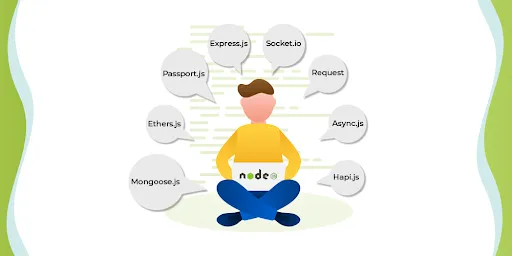What is Node.js?
Node.js is an open-source runtime platform for developing server-side web applications using JavaScript. Node.js is created using the cross-platform Python utility GYP (Generate Your Project). Other build phases are also implemented using Python. As a result, Python mandates that you construct Node.js from the source. Real-time online applications, social media applications, teamwork tools, multiplayer games, and API are ideally suited for Node.js. One of the most well-liked frameworks for building web servers is Node.js. Due to its versatility, it is frequently referred to as “The Swiss Army Knife of Programming Languages.“
What is a Node.js library?
A Node.js library is a repository of pre-written JavaScript code that can perform a particular task or set of functions. This can include working with HTTP requests, the file system, or creating server-side applications. Node.js libraries are typically installed using the npm package manager, which comes bundled with the Node.js installation. These libraries can be used in your Node.js applications to save time and make development easier.
8 Node.js libraries to know in 2023 are-
1. Hapi.js
Hapi.js (HTTP-API) is an open-source Node.js library for developing powerful and scalable web applications. Hapi is commonly used to create API servers, HTTP-proxy applications, and websites. It includes many unique features that allow developers to create secure, powerful, and high-powered applications. Hapi also prevents error messages from leaking information or echoing back exploits. Many businesses, including PayPal, Brainhub, and Beam, use Hapi.js framework for their websites and online APIs.
2. Async.js
Async.js is one of the best JavaScript backend libraries available to developers. It ensures the removal of render-blocking JavaScript and improves your web page performance. Async.js has functions for working with asynchronous JavaScript code. Asynchronous code is non-blocking, meaning that it does not stop the execution of other code while it is running. This is important in JavaScript because it allows your code to run more efficiently without getting bogged down by long-running operations. Moreover, it has several utility functions for working with asynchronous code, including managing control flow, working with collections, and creating asynchronous versions of common JavaScript functions. It can be used in browsers and on a server-side with Node.js.
3. Request
The Request JavaScript library provides a safe and dependable way for apps to access content from external sources by making HTTP calls. Data is obtained from external sources, including websites. It provides a simple interface for sending HTTP requests and receiving responses. This can be useful for accessing web APIs, sending data to a server, or making requests to other websites. The Request library is easy to use and flexible, allowing you to customize and handle the response in various ways. It can be installed using the npm package manager and is commonly used in Node.js applications requiring HTTP requests.
4. Socket.io
Socket.io is a node.js library that allows client and server interaction in a low-latency, bidirectional, and event-based manner. It works on any platform, browser, or device, with equal emphasis on dependability and speed. Socket.io is built on the WebSockets API and Node.js. It is the most widely used library on npm (Node Package Manager).
5. Express.js
Express.js is a Node.js-based open-source web application framework. It provides a simple API for creating robust, scalable, and maintainable web applications. Express has earned a reputation as the library with the most flexible and minimalist Node.js web framework. This library stands out because it performs as a speedy, unopinionated, minimalist web framework. With a simple and extensible framework that offers a number of popular utilities, Express will offer the finest assistance.
6. Passport.js
Passport is an authentication middleware and one of the best libraries for Node developers. It is adaptable, modular, and it turns out to be an Express-based web application. It provides a simple and flexible way to authenticate users in your web application. Passport supports many authentication strategies, including OAuth, OpenID, and LDAP. It can be used with different web frameworks, including Express and Connect. Passport makes it easy to implement authentication to your Node.js application, allowing you to focus on building the core functionality of your app. It can be installed using the npm package manager and is typically used in conjunction with other Node.js libraries and frameworks.
7. Ethers.js
Ethers.js is a JavaScript library for interacting with the Ethereum blockchain and its ecosystem. It is a complete, simple, and secure library for building Ethereum-powered applications. Ethers.js provides a clean, powerful, and easy-to-use API for working with Ethereum, including support for smart contracts, wallets, transactions, and more. It is flexible and extensible, allowing you to build a wide variety of Ethereum-based applications. Ethers.js can be installed using the npm package manager and is commonly used in Node.js applications that need to interact with the Ethereum blockchain.
8. Mongoose.js
Mongoose.js is a popular JavaScript library for working with MongoDB, a popular NoSQL database. MongoDB is a document-oriented database, which means it stores data in documents that have a flexible schema. Mongoose.js provides a straightforward, schema-based solution to model your application data. It includes built-in type casting, query building, validation, business logic hooks, and more. This makes it easy to work with data in your MongoDB database from your Node.js application. Mongoose.js can be installed using the npm package manager and is commonly used in Node.js applications that use MongoDB.
Did you know?
- Node.js is essentially a server that can run Javascript.
- It provides event-driven APIs
- Node.js is non-blocking, and it runs code asynchronously by default.
In a nutshell:
Node.js is the preferred framework for Node developers for enterprise applications and infrastructure. Each of the libraries mentioned above has proven useful at Incentius. Our development team has worked with Node.js libraries to develop various applications and found them handy to use.
Connect with us










